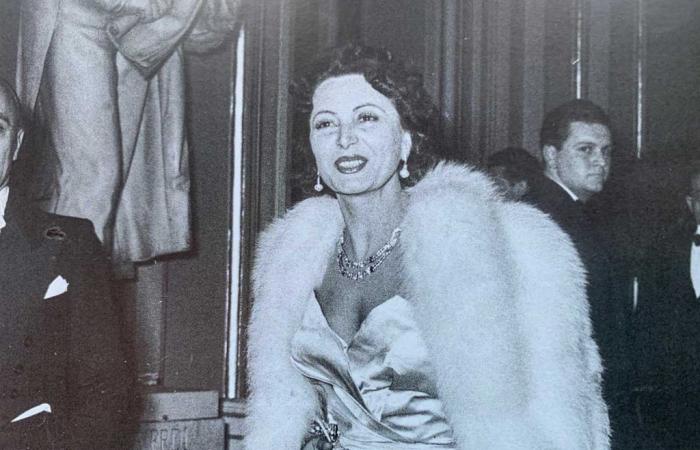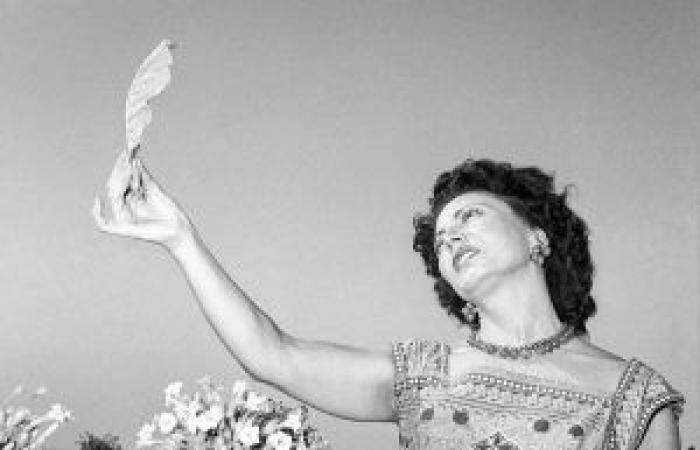Viterbo – Colonel Biribicchi: “From the interviews and research conducted by Silvio Cappelli, decidedly interesting aspects emerge, which deserve to be explored in depth, relating to local and national history in one of the most dramatic periods of our country”
| |
| Bianca Maria Hubner at the Teatro alla Scala in Milan on 7 December 1953 (photo taken from the book The Flying Baroness) Baroness Bianca Maria Hubner |
Viterbo – (pc) – The story of Baroness Bianca Maria Hubner, who in the twenty years between the Second World War (1940-1960) was the protagonist of the transformation of the Arcione agricultural company in Viterbo into Castel d’Asso, advertised in the national magazine “ Quaderni del Nastro Azzurro”, single issue of the first quarter of 2024, which is part of the Istituto del Nastro Azzurro among fighters decorated for Military Valor.
A three-page article was dedicated to her, signed by Colonel Osvaldo Biribicchi, as part of the “Book Reports” following the recent publication by Silvio Cappelli entitled: “The flying baroness. From the Teatro alla Scala in Milan to the necropolis of Castel d’Asso in Viterbo. The land transformation work carried out by Bianca Maria Hübner”. A valuable work – it is written in the article in the magazine – which “has made it possible to bring to light decidedly interesting documents, preserved in the State Archives of Viterbo”.
“From the interviews and research conducted by Silvio Cappelli – writes Colonel Biribicchi – decidedly interesting aspects emerge, which deserve to be explored in depth, relating to local and national history in one of the most dramatic periods of our country. Most of the people interviewed spoke in detail about the deep and particular friendship that the baroness had with Galeazzo Ciano, a powerful fascist hierarch and foreign minister. Furthermore, between September 1943 and June 1944 (the period in which Viterbo was part of the Italian Social Republic), it seems that Bianca Maria Hübner met Albert Kesselring several times, supreme commander, starting from the summer of 1943, of all the forces Germans in Italy.
The association with high society and important politicians, the participation in the social life of her time and in cultural initiatives – continued Biribicchi – were a habit for our noblewoman before, during and after the war.
In this context, she establishes and maintains friendships with people she is sometimes forced to turn to to speed up the cumbersome bureaucratic processes of administrative procedures. She is an enlightened entrepreneur, sensitive to the living conditions of her employees. Within the Arcione agricultural company, in addition to offices, warehouses and workshops, she creates houses and a school attended by the children of her employees and illiterate workers.
The school is equipped with showers, hot water, heating, a large kitchen and even an apartment for the teachers. Bianca Maria Hubner also established a traveling library, a coach service to transport the women who worked at the Tobacco Center to and from their homes”.
A precious cultural contribution, therefore, for the knowledge of the history of Viterbo which for about twenty years was intertwined with this special woman (1940 – 1960), of Piedmontese origins, who began her career as a silent film actress and who in In 1958 she obtained the honor of Commander of the Order of Merit of the Italian Republic, before then there were only three women in Italy who had achieved a similar recognition, for her efforts in the Viterbo agricultural company.
June 17, 2024







